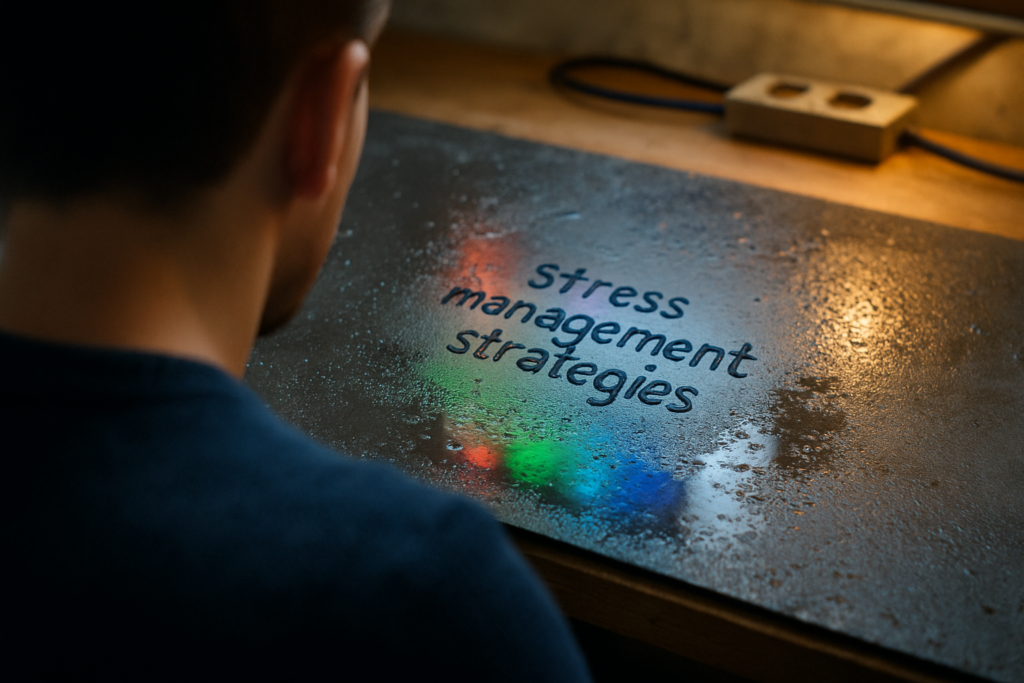Understanding the Link Between Stress and Skin Health
Stress profoundly impacts skin health, triggering various issues. Chronic stress can lead to conditions that visibly manifest on the skin.
How Stress Affects the Skin
Cortisol release is the primary mechanism by which stress affects the skin. Acute stress increases cortisol levels, leading to inflammation and hindering skin repair.
This hormone also stimulates oil production, causing clogged pores and acne. Stress can disrupt the skin barrier, decreasing its ability to retain moisture, making it dry and prone to irritation.
Increased inflammation also accelerates skin aging by breaking down collagen and elastin, leading to wrinkles and loss of elasticity.
Common Skin Conditions Exacerbated by Stress
Stress-related cortisol spikes can worsen several skin conditions:
- Acne: Stress-induced oil production clogs pores, leading to breakouts.
- Eczema: Stress causes flare-ups by increasing inflammation and skin sensitivity.
- Psoriasis: Stress can trigger immune system responses, exacerbating psoriasis symptoms.
- Rosacea: Stress increases blood flow, causing facial redness and inflammation.
- Hives: Stress can cause histamine release, leading to hives or itchy, red patches.
Understanding and managing stress is crucial for maintaining healthy skin and mitigating these conditions.
The Science Behind Stress-Induced Skin Issues
Stress wreaks havoc on skin health by triggering hormonal and neurotransmitter changes, compromising the skin barrier, and exacerbating chronic skin conditions.
The Role of Hormones and Neurotransmitters
Hormones significantly impact stress-induced skin issues. Cortisol, the primary stress hormone, increases during stressful periods, leading to inflammation and disrupted skin repair.
For example, high cortisol levels stimulate excess oil production, causing acne flare-ups. Neurotransmitters like substance P also play a role by increasing blood flow to the skin, intensifying inflammation and rosacea symptoms.
The Impact of Stress on Skin Barrier Function
Stress impairs the skin barrier, reducing its ability to retain moisture and protect against irritants. When the skin barrier weakens, conditions like eczema worsen due to increased transepidermal water loss.
Stress-induced lipid production change further compromises barrier function, leading to dry, irritated skin.
Practical Tips for Managing Stress to Improve Skin Health

Managing stress is crucial for maintaining healthy skin. Effective strategies can make a significant difference in preventing stress-induced skin issues.
Lifestyle Changes and Stress-Reduction Techniques
Adopting specific lifestyle changes and stress-reduction techniques can help mitigate the impact of stress on skin health. Here are some actionable tips:
- Exercise Regularly: Physical activities like jogging or yoga reduce cortisol levels and increase endorphin production.
- Adequate Sleep: Aim for 7-9 hours of sleep per night to allow the skin time to repair and regenerate.
- Healthy Diet: Consume antioxidant-rich foods, such as berries, nuts, and leafy greens, to combat oxidative stress.
- Mindfulness and Meditation: Practices like meditation, deep breathing, or progressive muscle relaxation can lower stress levels.
- Hydration: Drink at least 8 cups of water daily to maintain skin hydration and elasticity.
- Limit Caffeine and Alcohol: Excessive intake of caffeine and alcohol can disrupt sleep cycles and increase stress.
- Gentle Cleanser: Use a mild, non-comedogenic cleanser twice daily to remove impurities without stripping natural oils.
- Hydrating Moisturizer: Apply a moisturizer with hyaluronic acid or ceramides to maintain the skin barrier.
- Sunscreen: Use a broad-spectrum sunscreen with SPF 30 or higher to protect against UV damage.
- Topical Treatments: Use over-the-counter products with ingredients like salicylic acid or benzoyl peroxide to manage acne.
- Avoid Harsh Products: Steer clear of products containing alcohol, fragrances, or strong acids that can irritate stressed skin.
- Routine Adjustments: If new skin issues arise, consider consulting a dermatologist for tailored advice.
Professional Treatments and Therapies
Professionally guided treatments can significantly mitigate stress-induced skin issues. Knowing when to seek dermatological help and understanding the benefits of these interventions are crucial.
When to See a Dermatologist
It’s essential to consult a dermatologist if you experience persistent skin issues. Chronic conditions like acne, eczema, and psoriasis often worsen under stress. Dermatologists provide tailored treatments that address both skin symptoms and underlying stress factors.
The Benefits of Professional Skin Treatments
Professional treatments offer precise care that home remedies can’t match. Services like chemical peels help reduce acne scars and hyperpigmentation.
Laser therapies effectively target deeper skin layers, promoting rejuvenation. Microneedling enhances collagen production, improving skin texture and elasticity.
Opting for these treatments ensures expert handling and better outcomes for stress-related skin issues.


 Bradley Frankirly is a distinguished article writer at Body Care And Matter, bringing a unique perspective to the world of health and wellness journalism. With a keen eye for detail and a passion for storytelling, Bradley crafts articles that resonate deeply with readers, offering both informative content and a relatable narrative.
Bradley Frankirly is a distinguished article writer at Body Care And Matter, bringing a unique perspective to the world of health and wellness journalism. With a keen eye for detail and a passion for storytelling, Bradley crafts articles that resonate deeply with readers, offering both informative content and a relatable narrative.

